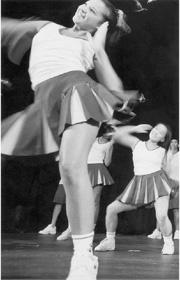SHORTLY BEFORE HALLOWEEN last year, Rob Tepper, a.k.a. “T-Man,” KUBE 93’s morning radio DJ, hosted a beauty pageant of sorts at Gameworks. It was called the Miss Flat America contest, and it dangled an astonishing top prize before the winner: breast augmentation surgery, compliments of the radio station. A couple of months later T-Man’s sidekick, a 23-year-old woman nicknamed “Lifeguard,” decided to get breast implants. Her surgery, performed on January 14 by Dr. E. Antonio Mangubat of Southcenter Cosmetic Surgery and Hair Restoration, Inc., was broadcast live with a Howard Cosell-style play-by-play.
That neither of these stunts prompted any public response, let alone outrage, suggests that breast augmentation has become so popular that it’s now an acceptable part of our culture. Your neighbors are doing it, and, as evidenced by the KUBE demographic, their kids will, too. If Seattle women have been stereotyped as shunning cosmetics and tight clothes in favor of natural beauty and a relaxed, casual style, that image all but disappears when you listen to T-Man’s show. Young, single women regularly go on KUBE to talk about sex or be set up on blind dates. After some initial pleasantries, listeners are given a rundown of the woman’s physical attributes. One morning, after he told a woman that she was “cute,” T-Man added, “but you could really use bigger breasts. C cups would be perfect for you.” Then he offered to put her in touch with Dr. Mangubat. For anyone who’s considered plastic surgery, T-Man’s endorsement is a powerful thing indeed.
Once the tawdry subject of checkout-line tabloids, breast augmentation has become the second most popular procedure within the field of cosmetic surgery. (Liposuction tops the list.) The American Society of Plastic Surgeons reported that in 1998 over 132,000 breast augmentation surgeries were performed in the US, approximately 50 percent more than in the previous two years. (Figures for 1999 have not yet been reported, but it’s a safe assumption that the popularity of silicone breasts hasn’t sagged a bit.)
When interviewed by phone, Tepper, who has a boyish voice with traces of a Brooklyn accent, stated that his unusual giveaway was “a sign of the times”—of not only racier material on radio and TV, but the sheer desire of women wanting to surgically alter their figure. “Women want breast implants,” he said. “Thousands and thousands of women wanted to be in our contest, but we could only pick 50 finalists.”
WHEN ASKED FOR her reaction to the “Miss Flat America” contest, feminist writer Erica Jong replied via e-mail, “Until we change the values that tell women only their appearance matters, we will have these absurdities. Our society is spiritually bankrupt. Many women think big tits will give them value. I find it sad—both for the women who fall for this promotion and the promoters.”
Dr. Harry Brandt, director of the Center for Eating Disorders in Baltimore, Maryland, also weighed in during a recent phone interview. “I think it’s a pathetic social commentary,” he said. “I have patients with life-threatening disorders because of negative body image. They’re getting messages from the media constantly that they’re not acceptable the way they are. . . . All this cosmetic surgery craze is part of an obsessive need for bodily perfection that misses the boat.”
It may be tasteless and offensive, but the Miss Flat America contest signifies a natural progression of ongoing forces. Despite social strides made in the last 20 years to celebrate people’s differences, many of us, particularly women, remain plagued by conventional standards of beauty. And although psychologists tell us to work on our self-esteem rather than succumb to the knife, the argument often seems like a chicken-and-egg problem. Which came first? Beauty or self-esteem? Since our society values a woman’s beauty to such an extent, isn’t it also fair to say that it would be to our advantage to seek bodily perfection? In the case of T-Man, you’ve got a local, vocal personality who can cajole those who might have been on the fence to go ahead, get “cute”—in the most insensitive way imaginable. You’ve got a flat chest? Here’s a $5,000 solution. Do you listen to KUBE 93? It could be free!
LOCATED IN A GLASSY complex down the street from the Toys “R” Us near Southcenter Mall, Dr. Mangubat’s office bustled with customers on a recent visit. Two women walked out, one of whom leaned against the other for support. She looked like she’d been in a fight and lost: Her nose was taped, her head wrapped in bandages like a bonnet; her face was swollen and her right cheek was blue, her skin stretched tight by the pressure underneath.
A few minutes later, a pretty blonde entered. She wore a form-fitting T-shirt, stonewashed jeans, and platform boots. Even with heavy makeup she didn’t look older than 22. She revealed that she had her breasts enlarged a week earlier. “It hurt so much for the first couple of days,” she confessed. “I couldn’t lift my arms. I had to stay in bed all day.” Now she’s back to normal—except that she’s getting noticeably more attention from men. Just that morning while she was grocery shopping two men did a double-take and said hello. She thought it was funny, how guys fall all over themselves for her new figure.
Dr. Mangubat, who is short and compact and looked to be in his mid-40s, said that a woman choosing to get breast implants is no different from her choosing to wear lipstick or earrings. “They do it for fashion,” he said. “Patients come in here with wedding dresses, and they tell me, ‘I want to fit into this.'”
But Dr. Mangubat can truly empathize with his patients. He himself has undergone three cosmetic procedures: a chin implant, liposuction, and removal of bags under his eyes. “Now when I look in the mirror, I don’t hate what I see. I am happy to take pictures now.”
When asked if he thought his ties to KUBE would harm his reputation, the doctor replied, “The station just wanted to have fun. But I told them, once they’re here in my office, it wasn’t going to be sleazy. The women would come of their own volition. They wouldn’t be made fun of. And the operation will be just like any other, with safety being the number one concern.”
However, he admitted that several anonymous critics have left disapproving messages on his answering machine. He suspects they’re from other doctors who are envious of his success. “A doctor’s name came up on my caller ID,” Mangubat said.
If all of this sounds like Howard Stern has spawned another version of himself in Seattle, get used to it. KUBE 93 producer Eric Powers says that T-Man’s morning show holds firm as the number one broadcast in the Puget Sound area. No advertisers have pulled out their endorsements since the Miss Flat America contest, and it’s likely the station will hold another pageant later this year. It seems that even in this rainy, cover-yourself-up region, we are willing to listen to people who offer to make us look better in the flesh—however off-putting their tactics.
At a visceral level, we are attracted to and crave physical beauty; perhaps that is why we distrust it and scorn vanities like silicone breasts on an intellectual level. Meanwhile, an ever-increasing number of women are viewing cosmetic surgery as the way to stop feeling bad about their bodies. And T-Man and Dr. Mangubat are cheering them on.







